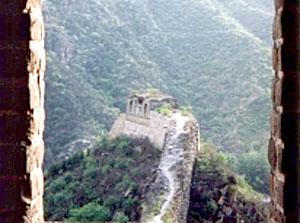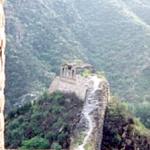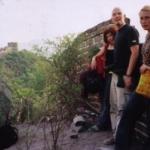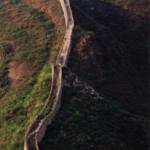A Will For The Wall
"So when exactly are we going to get to the Wall?" I hesitated to ask my Swedish traveling partners over our sticky, hand-held wraps of deep-fried tofu, egg and green scallions.
Three days into their two-week stay in Beijing, the grand finale of an ambitious six-month backpack that cut right through the middle of Asia, Tobias and the two boisterous sisters Mari and Jetta were in no rush whatsoever. In fact you could say that they were on a completely different time schedule than I was, and maybe the rest of China for that matter. For although it was a warm, relaxing summer afternoon, I was on my last day in China, flying back the next morning to my home in southern Japan. Most worrying was that I hadn't yet set eyes on the Great Wall, the one "must see" part of my itinerary.
The girls, on a yearlong break after finishing college, were crouching next to the dusty sidewalk and murmuring to themselves in Swedish, a language only slightly less decipherable than Beijing Mandarin to my ignorant Canadian ears. Tobias filled me in with a toothy half-smile, "The girls were hoping that today would be the day that we could all go and visit Ikea."
Ikea? That icon of Scandinavian design and eternal yuppy desires? Surely there was some joke at play here. "No, it's true," he added with a chuckle. "The girls have been talking about it non-stop since Kunming. I think they're a little homesick or something. And besides I was kind of hoping that we could bring along some sweets for the Wall." And after staring that futile argument in the face for a moment, I followed the Swedes to the University district of northern Beijing, to the sparkling new yellow and blue Ikea outlet.
Mari, dark haired and shorter than her sister and hissing through a chipped tooth she had picked up in a Madras nightclub, tried her best to build my excitement for a visit to this perfect symbol of western consumerism on a day earmarked for perhaps the greatest human creation of all time.
"We've been talking with quite a few tourists in town who swear that the Chinese are actually very interested in Ikea. It's apparently packed wall-to-wall every day of the week and the strange thing is that they're not even there for the shopping, at least not many of them. You see, where they've set up displays, you know, showrooms or kitchenettes or whatever, there are apparently these Chinese shoppers just sitting there on all of the furniture, not testing the stuff out but more like just hanging out for hours and really putting it to use. The store is supposed to be creating some kind of rule saying that every shopper has to buy at least one item before they can leave, because it sounds as if the whole thing is out of control."
It all seemed a bit far-fetched, a spot of "put one over on the dumb Canadian," but it was worth a look. And besides, a couple of years in Japan had taught me to believe the unbelievable, at least when it came to Asia.
Sure enough, the second we stepped into the cavernous building, we were met with a rush of human traffic pushing through the crowded aisles. And indeed, as we rode the escalator up to the bright display rooms, there they were, everyday Chinese shoppers actually lounging out on all of the furniture. There were older men, sometimes three across, lost in naps on the brand new beds. There were doting couples getting cozy on white canvas loveseats, and there were a number of young university students studying away at a wide selection of desks and computer tables. Once again Beijing had surprised me, just like it had with it's suffocatingly well received McDonald's on Tiananmen Square, or with the current slough of ten-year-old boys with toy AK-47s slung over their shoulders near the scene of the 1989 massacre.
Over an afternoon snack of Swedish meatballs, pickled herring, Swedish berries, and another dozen or so otherwise unknown Scandinavian treats, the now very placated Swedes and I thumbed through our guidebooks so as to best plan our attack on the Great Wall.
Far away from the tourist-infested sections of the Wall, with their brightly polished stones, new cable cars, and the ubiquitous Mao souvenir shops, are a number of less populated and less traveled sections of the Wall where one might get more of a sense of solitude. We decided on a location accessed from a village about two hours north of the city center, in an area called Huangua where the dense woods meet the sloping mountainside.
We climbed aboard an older model domestic bus with about a dozen locals heaving huge sacks of grain, buckets of leafy vegetables and the odd plucked chicken. No other backpackers to be seen in this group. The glut of buildings gradually transformed into a wide expanse of barren valleys that sat in shadows below the looming hilltops.
A little over an hour into our adventure we transferred over to a tighter and mustier bus for the last leg to the base of the ruined wall. Through a smudge in the grimy window I looked out at the amber sun fading away at a sharp angle and surmised that we didn't have more than a few hours of sunlight left.
By four in the afternoon we had arrived at a dusty clearing next to an open reservoir, an area ringed with a few wooden stalls selling mostly cheap trinkets and leftover lunch specials. One long look up revealed the Wall dropping down from a point high above the peaks to a place where it joined the road not a hundred feet from us.
At that moment we were swarmed by six or seven vendors selling various wares, from overpriced, expired APS film, to overpriced lukewarm bottled water, to overpriced, faded government-issue postcards. Tobias had evidently done his fair share of haggling in China for he seemed to know the going rate for expired APS film and didn't hesitate to laugh openly when offered the same film for five times the price. The stout, gap-toothed, fifty-something vendor responded with her own ridiculous belly laugh at his counter offer as if she had been presented with beads in exchange for her youngest daughter. It was a scene I had witnessed a dozen times in the back alley hutongs in Beijing and it seemed to be the first lesson of Chinese Haggling 101.
With provisions underarm, we set out across a narrow footpath over the reservoir until we were met on the other side by a flimsy, off balance sheet of plywood masquerading as a table. Behind it sat three dour looking middle aged Chinese men dressed in various shades of grim gray, who outstretched their palms while motioning towards a neat hand-printed sign that read in English, "These trees are our livelihood, please give us 5 yuan."
We considered their proposition for a moment, diplomatically pledged to leave all Chinese trees unmolested, including the pile of logs with which they had propped up their makeshift table, and continued to hike up the path. One of the men scrambled out of his seat and up the trail ahead of us, where he turned to confront us face-to-face. It seemed he wasn't used to having his scheme fall on deaf ears. Tobias explained in his best first-year-University Chinese that perhaps if the men had uniforms, tickets, some form of identification or even so much as proper table to mark some authority over the territory we might reconsider their surly requests. After a few more rejected claims we climbed the fifty feet up towards the dilapidated first tower that hung over the reservoir.
My feelings of continued suspicion were confirmed with the sight of a lone wooden ladder disappearing up through the hollowed gut of the tower only to be replaced by a smiling Chinese woman with her hand out and a vaguely familiar smile. Tobias groaned and ran his hands over his bald head for a moment while the girls stepped around the fortification to survey our options. No, it was certainly clear to Tobias and I that there was no other way around this clever little plan, as the flat bricklike stones on the outside of the building stretched twenty-five feet into the air without handholds of any sort.
"Come on up boys!" shouted the women from above us at which point we looked up to see that they had not only scrambled up the face of the tower but had done so while hauling their backpacks and while wearing only simple walking shoes on their feet. After a dumbfounded and pride-challenging minute, Tobias himself was heaving out-of-breath beside them, to be joined soon thereafter by a bleeding Canadian, with both arms and legs cut by the brambles that sadistically covered a lengthy detour around the obstacle.
The Wall itself, when viewed from this first lookout, was a marvel, epic in proportion, which dwarfed everything by comparison. Even at its smallest dimensions it was at least twenty feet high and ten feet across, not to mention the nearly 4000 miles of length from west to east. The Wall crumbled here, a bit more with every step. The white trodden path that meandered over the loose gravel was devoid of any other tourists, although we were still forced to defend our depleted stock of yuan from a few more budding entrepreneurs as we climbed up through five successive towers, all while the day approached that golden point of dusk.
We stopped for a moment to hang our legs over the Wall at a perfectly preserved tower and it was here that the Swedes decided they would try their luck later and camp that same evening. There were the recent remains of a blackened campfire and enough shelter within the tower itself to protect a few people from the elements overnight. At that point I realized that I would be going back to Beijing alone, and I began to think about all that getting back would entail at that hour of the evening.
Surely if there were any regular buses from Huangua they would have all gone back by sundown, meaning that I would almost definitely be arranging my own transport back to the capital if I had any hope of making my eight AM flight back to Japan. For the moment at least, we turned our thoughts to the makeshift summit that was the ultimate panorama point on this section of the Wall. The angle of incline was extreme, and we were forced to go at it on all fours as we pulled ourselves up the loose rock towards the lip of the ridge. From there a 360 degree view opened up all around us and we could see that that the Wall snaked over a number of peaks and valleys like a never-ending roller coaster that simply disappeared into the horizon.
The sky, which had thus far been covered by a wafer-thin layer of hazy cloud, now seemed like an enormous canopy as it enveloped the terrain in a dying yellowish light. The Wall here, far from the city lights, had been pulled apart at various times over its two-thousand year history, mostly by villagers desperate for cheap building materials, but the Wall had always managed to be rebuilt by one ruling power or another, especially when national defense or, more recently, tourist dollars were at stake.
Again the Wall sloped downwards like an Olympic ski jump, not surprising, as it was constructed on some of the most impenetrable points of the highlands, and the structure hadn't been restored here at all. We took great care in inching down the gravel top while the bricks we clutched for handholds occasionally fell away towards the valley floor. The light became fainter and fainter, subtly changing the mood of the evening to that of a closing procession. The women had skipped ahead, almost effortlessly, while Tobias and I clung to the crumbling arches, staying close enough together to avoid an even quicker descent. Eventually we reached the very bottom of the valley floor, the place where we would part with short warm embraces after a week of adventures together.
I stumbled along alone in the near-darkness as the cloud cover slowly peeled back to reveal an almost-full moon to light the widening path ahead. The trail was constructed of loose reddish rock twisted around various ruins, and eventually it bisected an orchard, where I spotted three Buddhist stone markings below a bushy tree. I wondered what fate could have met anyone at this place of tranquility, that is until the path met the road soon thereafter and I found two famished looking dogs chained to an old building. Mongrels that seemed to be considering me for another evening snack. The uninviting hostel here wasn't even an option, not if I was to make my early flight at least, so I stomped up the road to the same clearing where we had begun our afternoon tramp.
After arriving at the village and scanning the dusty frontier, I cursed my misfortune as I realized that the only soul left hanging around the stalls was a grinning, gap-toothed woman, clapping her hands in front of her while guffawing at her great luck. My only hope of getting back to Beijing before morning lay in the hands of the biggest crook in town, the same woman who we had walked away from in jest only hours before.
I made a pathetic effort at milking some sympathy, even pointing to the Canadian badge on my pack, as if coming from the land of ice hockey, maple syrup, and Bethune was going to get me out of this jam. She nodded her head sarcastically as the smile grew wider and wider. The evening came to a fitting close after I struggled to combine my five words of Mandarin with a number of rudimentary hand gestures, at which point she finally called out for a cutthroat dealer in an old jalopy of a truck who negotiated limousine rates for a rough but fortunate ride back to Beijing.
* * * * *
 ThingsAsian
ThingsAsian




















